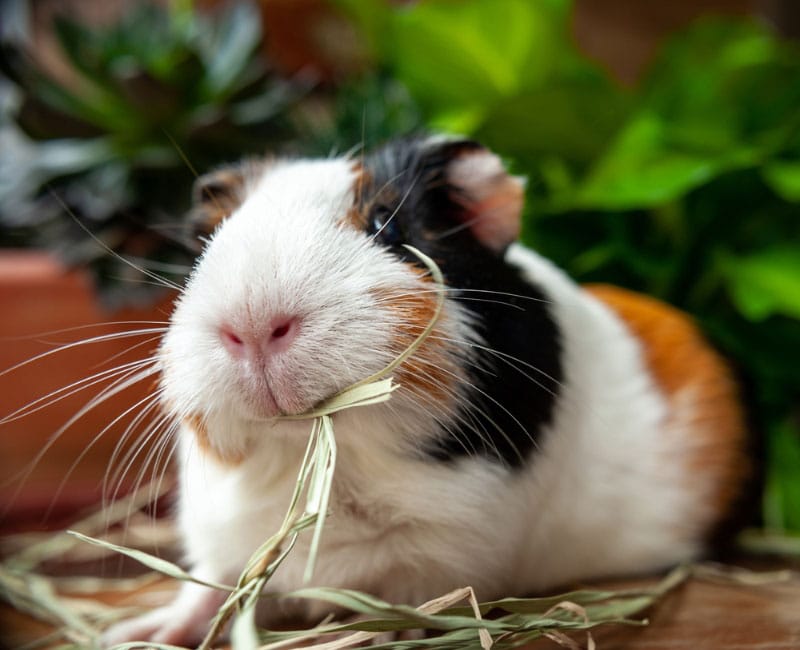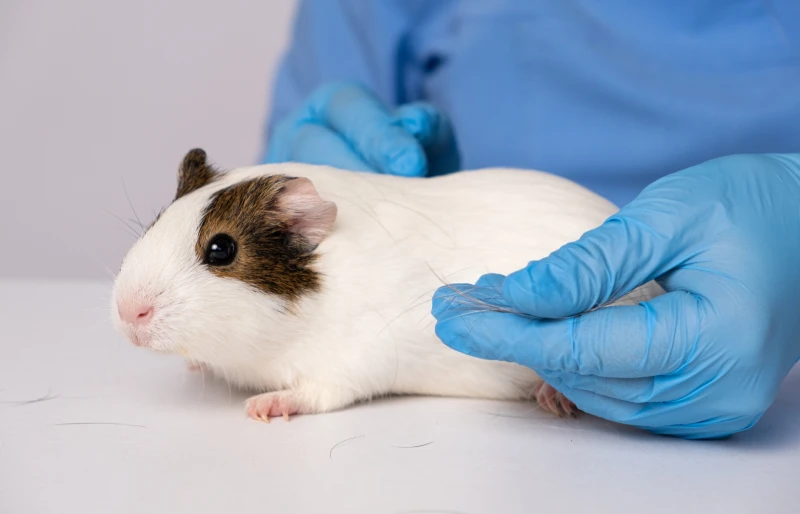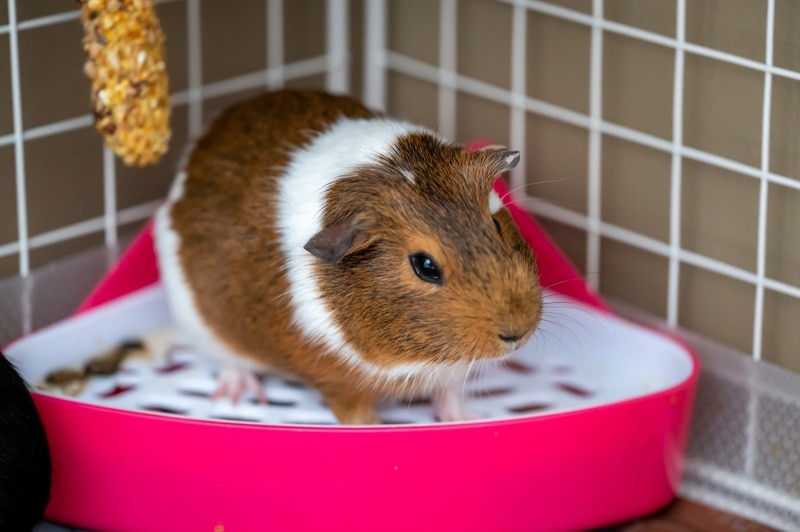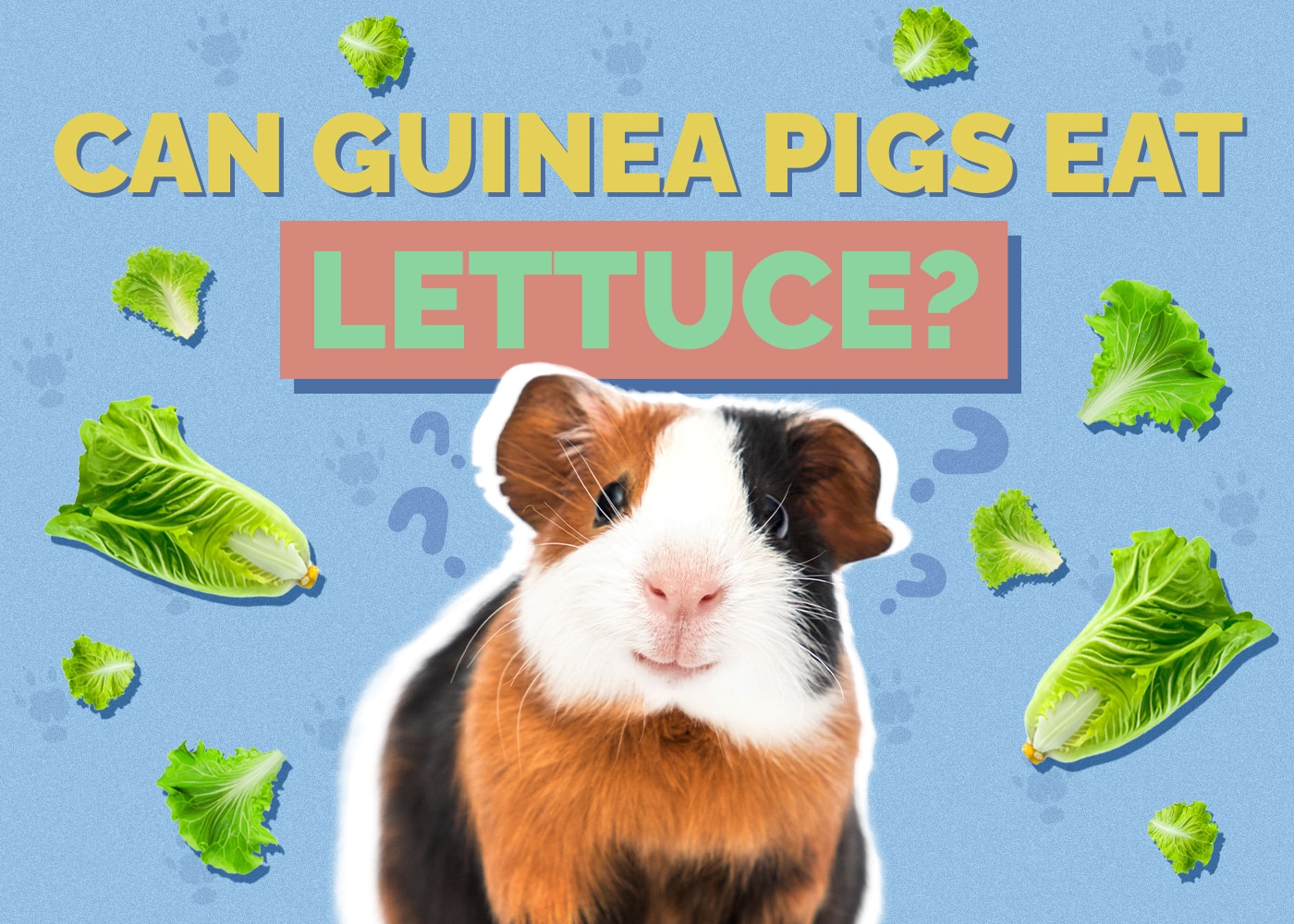Can Guinea Pigs Eat Rabbit Food? Vet-Approved Safety Concerns & FAQ
Updated on

It may feel like a small detail since, surely, rabbit food is not all that different from guinea pig food, right? You may find yourself asking this question, particularly if you bought rabbit food by mistake or if it was all that was available to purchase at the store. Both guinea pigs and rabbits are herbivores; however, feeding rabbit food to guinea pigs is not advised, as rabbit food does not contain the correct amounts of vitamin C a guinea pig needs to consume daily.
Rabbit and guinea pig diets are, upon closer inspection, quite different due to guinea pigs requiring certain nutrients and different quantities of nutrients when compared to rabbits. A guinea pig frequently eating rabbit food will begin to suffer health issues with potentially serious consequences.
Is Rabbit Food Safe for Guinea Pigs?
Unfortunately, it is not. This may seem an inconvenience or even a marketing ploy to encourage you to purchase two bags of food, especially if you keep both rabbits and guinea pigs. And given both their pellets are visibly identical and smell the same, it’s understandable. In reality, though, there are important differences between the two.
Guinea pigs are rodents, Cavia porcellus and belong to the Caviidae family. Rabbits, Oryctolagus cuniculus domesticus, are part of the Lagomorph family and not rodents. As you can see they are quite different as species so it makes sense that they have different nutritional requirements.
Guinea pigs, like humans, cannot manufacture their vitamin C; therefore, guinea pig pellets have an added stabilized vitamin C, which makes it easier to absorb. Rabbit pellets do not contain this feature. Furthermore, rabbit pellets do not contain enough fiber and protein, as rabbits need less of these nutrients than guinea pigs do. Certain rabbit pellets also contain seeds as a fat source, which guinea pigs can’t digest well.

Why Does My Guinea Pig Need Vitamin C?
Guinea pigs cannot synthesize vitamin C, meaning the body can’t make it and therefore it must be consumed daily via their diet. Vitamin C is necessary for developing and maintaining many bodily tissues and functions, such as skin, gums, and joints, and aids in the healing of wounds.
Insufficiency or deficiency of vitamin C predisposes your guinea pig to many problems, such as scurvy. Many veterinarians will recommend adding a vitamin C supplement to their diet.
- Dry, rough hair
- Dandruff
- Not eating or eating less
- Diarrhea
- Swollen feet and/or joints
- Overall pain
- Bleeding and ulcerated gums
- Difficulty walking
What Should I Feed My Guinea Pig?
Guinea pigs are herbivores, meaning they only eat plants and plant-based foods. While true wild guinea pigs eat a mixture of different fresh grasses, weeds, leaves, vegetables, and fruits, pet guinea pigs often eat or are fed quite differently. However, they still need to receive food that resembles their natural diet as closely as possible.
The Gold Standard Diet for Guinea Pigs
Hay and Grass
Grass is the guinea pig’s natural diet, but hay can be used also. The hay you choose to feed needs to be grass hay, not hay made from legumes, for example, and should make up around 80% of their daily intake of nutrition. Offer them hay or grass in abundance and continually for them to munch on throughout the day and night. Access to hay or grass must always be available for guinea pigs and never limited.
Hay and grass are not only important from a nutritional standpoint, but guinea pigs also require them to maintain a healthy and properly functioning digestive system. It does this by providing them with the necessary fiber and bacteria to aid fermentation in their intestines.
Simultaneously, eating hay also wears down their teeth, helping to maintain them. Guinea pigs’ teeth constantly grow, and eating hay and grass helps to keep them worn down to a comfortable and correct length. If not, their teeth will continue to grow, and it will be necessary to visit your veterinarian for the teeth to be burred down. Overgrown teeth cause significant dental disease, potential tissue injuries around the face, discomfort, and eating problems.
It’s important to note when feeding grass, lawnmower clippings cannot be fed to your guinea pig, as they disrupt their gastrointestinal systems.

Fresh Greens and Vegetables
Vegetables should also be fed to your guinea pig daily, around a cup per day. This can include collard greens or other vegetables, such as courgettes, kale, and lettuce (romaine, cos, red leaf, or little gem). Iceberg lettuce is not recommended since it is made up of mainly water and has few nutrients.
Offer them a variety of veggies, ideally five to six different kinds split into morning and evening feedings. Daily vegetables are needed to offer balanced nutrition, and some greens like asparagus, kale, and spinach are also higher in vitamin C, which is a vital vitamin guinea pigs must consume daily.
A useful chart allowing you to compare the nutritional values of individual vegetables and fruits against each other in the guinea pig can be found here.
- Spring Greens
- Beetroot
- Carrot tops
- Parsnips
- Watercress
- Rocket
- Ripe tomatoes (do not feed the vine or leaves, as these are toxic)
- Swiss Chard
- Bell Peppers
- Squash
- Broccoli (too much of this power veg can cause gas)
- Dill
- Sage
- Thyme
Pellets
Special grass pellets produced specifically for guinea pigs are also given daily alongside hay and veggies. A tablespoon a day for each guinea pig is sufficient. Ensure the pellets are all the same size, shape, and color; otherwise, they have a habit of only picking out certain ones and not getting all the nutrition they require.
Muesli-style guinea pig diets often sold in pet stores contain a mixture of pellets, flakes, and seeds. Although these are intended for, and packaged for, guinea pigs, they are an unsuitable diet. Guinea pigs are smart creatures and know what they like! With muesli-style diets, they selectively eat only picking out the best yummy bits, such as sunflower seeds, and leaving the rest. This seriously hampers their nutrition, causing multiple health problems. Muesli diets are also low in fiber and high in sugar, which can easily cause weight gain, dental problems, and upset tummies.

Water
Fresh drinking should always be available via sipper bottles, not bowls.
Fruit Snacks
Many cavy owners like to give their guinea pig a treat, and an odd bit of fruit is fine if it is given in small amounts and non-toxic. Fruit is naturally high in sugar and can increase weight gain and disrupt the gastrointestinal system, sometimes causing diarrhea.
- Apple (remove the seeds, as these are toxic)
- Banana
- Blueberry
- Cherry (stone removed)
- Kiwi
- Melon
- Pear
- Plum (stone removed)
- Strawberry
Conclusion
Each species has its own diet, specifically because their requirements are all different. Even though the diets may seem similar to the eye, they are not. Guinea pigs, rabbits, and other small animals have their own individual diets for a reason, which is usually nutritional based and backed by science, so it’s imperative to feed your pets the correct one.
Feeding a diet manufactured for another species will lead to health complications and disease, especially if you do it long-term. If you are unsure about any aspect of their diet, which veggies and fruits are safe to offer, or their general condition, contact your veterinarian to discuss the matter further.
See Also:
- Can Guinea Pigs Eat Sugar Snap Peas? Vet-Reviewed Facts & FAQ
- Can Guinea Pigs Eat Hamster Food? Vet Approved Facts & FAQ












